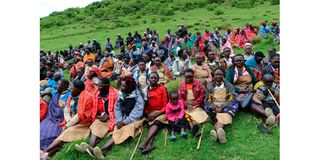Mainstream indigenous women's issues, says UN official

Sengwer women gathered in Embobut Forest in 2019 to celebrate the International Day of the World's Indigenous Peoples. A study indicates that 89 per cent of indigenous women lack literacy skills crucial to securing better livelihoods.
What you need to know:
- UN’s Indigenous Peoples and Development Branch-Secretariat of Indigenous Forum, social affairs officer Mirian Masaquiza, says indigenous women need the support of the non-indigenous community to progress.
- In Africa, of the 18.5 million indigenous women who live in the continent, only 0.6 per cent have advanced education.
A United Nations (UN) officer has urged the private sector and academia to mainstream indigenous women’s issues in their work.
UN’s Indigenous Peoples and Development Branch-Secretariat of Indigenous Forum, social affairs officer Mirian Masaquiza, said the indigenous women need the support of the non-indigenous community to progress.
“Non-governmental organisations, academia (and) students can do a lot of things. You can for example, include indigenous women’s concerns in your advocacy work and project,” she said during an Inspiring Indigenous Women and Girls’ webinar by United Nations Association of the USA.
“You can help raise funds for participatory development and projects that address the situation of indigenous women,” she added.
In Africa, of the 18.5 million indigenous women who live in the continent, only 0.6 per cent have advanced education, according to the Global Study on Situation of Indigenous Women and Girls (2020) report by International Indigenous Women's Forum.
Beijing Declaration
In the report, the 12-strategic commitments made under Beijing Declaration and Platform for Action are analysed in relation to barriers hindering sustainable development of the indigenous women and girls.
On education, 89 per cent of them lack literacy skills crucial to securing better livelihoods.
The declaration crucially commits governments, international community and civil society, including non-governmental organisations and the private sector to act on women’s poverty, armed conflict, education, and health and end violence against them.
But not a single country has fulfilled the commitments according to UN Women ‘analysis on progress made this far, with indigenous women being left far behind. This is because country-level laws still don’t recognise them hence, eliminating possibilities of responding to their needs.
For instance, by understanding their distinct inequalities in access to healthcare services, countries could establish laws and policies to ensure fair treatment when seeking maternal health care.
Victims of insecurity
In Kenya, according to International Work Group for Indigenous Affairs (IWGIA), indigenous communities include the Ogiek, Sengwer, Yaaku Waata and Sanya. Others are Endorois, Turkana, Maasai, and Samburu.
IWGIA notes most of these communities as victims of insecurity in the possession of land and resources, poor service provision, low political representation, discrimination and exclusion, obstacles that derail any socio-economic empowerment for their women and girls.





